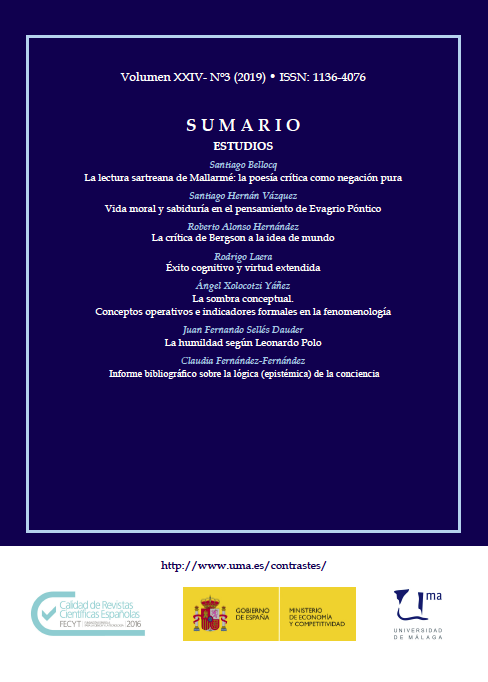Éxito cognitivo y virtud extendida
DOI:
https://doi.org/10.24310/Contrastescontrastes.v24i3.7552Palabras clave:
Mente extendida, virtud epidémica, éxito cognitiva, externismo,Resumen
El objetivo del presente trabajo consiste en presentar la noción de virtud extendida considerando tres aspectos fundamentales de éxito cognitivo (i) el carácter dinámico de la recolección y evaluación de evidencias; (ii) la fiabilidad de los procesos de predicción; (iii) la aptitud para tratar con un contexto dado, donde las capacidades extendidas se integran con las no extendidas. En este sentido, el éxito cognitivo es producto de una función entre la recolección de evidencias y su costo en tiempo y esfuerzo. La virtud extendida tiene como fin reducir dicho costo.
Descargas
Métricas
Publicación Facts
Perfil de revisores N/D
Información adicional autores
Indexado: {$indexList}
-
Indexado en
- Sociedad Académica/Grupo
- N/D
- Editora:
- Universidad de Málaga
Citas
ADAM, F. & AIZAWA, K., 2008. The bounds of cognition. Oxford: Blackwell.
BURDMAN, F «El post-cognitivismo en cuestión: extensión, corporización y enactivismo». Principia 19(3), pp. 475–495.
BURGE, T., 1986. «Individualism and psychology». The Philosophical Review, 95(1), pp. 3-45.
CLARK, A., 2015. What ‘extended me’knows». Synthese, 192(11), pp. 3757-3775.
CLARK, A. & CHALMERS, D., 1998. «The extended mind». Analysis, 58(1), pp. 7-19.
GOLDMAN, A., 2010. «Why social epistemology is real epistemology». En: A. Haddock, ed. Social Epistemology. Oxford: Oxford University Press, pp. 1-28.
GRECO, J., 2002. «Virtues in epistemology». En: P. K. Moser, ed. The Oxford handbook of epistemology. Oxford: Oxford University Press, pp. 287-315.
KVANVIG, J., 1992. The intellectual virtues and the life of the mind: On the place of the virtues in contemporary epistemology. Savage: Rowman & Littlefield.
MENARY, R., 2007. Cognitive integration: Mind and cognition unbounded. London: Palgrave Macmillan.
PRITCHARD, D., 2010. «Cognitive ability and the extended cognition thesis». Synthese, 175(1), pp. 133-151.
PRITCHARD, D. & PALERMOS, S., 2013. «Extended knowledge and social epistemology». Social Epistemology Review and Reply Collective, Volumen 8, pp. 105-120.
PUTNAM, H., 1975. «The Meaning of ‘Meaning’». Language, mind, and knowledge. Minnesota studies in the philosophy of science, Volumen 7, pp. 131- 193.
RUPERT, R., 2009. Cognitive Systems and the Extended Mind. Oxford: Oxford University Press.
RUPERT, R., 2010. «Extended cognition and the priority of cognitive systems». Cognitive Systems Research, 11(4), pp. 343-356.
SOSA, E., 1991. Knowledge in Perspective: Selected Essays in Epistemology. Cambridge: Cambridge University Press.
SOSA, E., 2007. A Virtue Epistemology: Apt Belief and Reflective Knowledge, Vol. I. New York: Oxford University Press.
SPREVAK, M., 2009. «Extended cognition and functionalism». The Journal of Philosophy, 106(9), pp. 503-527.
STERELNY, K., 2010. «Minds: extended or scaffolded?» Phenomenology and the Cognitive Sciences, 9(4), p. 465–481.
Descargas
Publicado
Cómo citar
Número
Sección
Licencia
Esta revista provee acceso libre inmediato a su contenido bajo el principio de hacer disponible gratuitamente la investigación al público. Todos los contenidos publicados en Contrastes. Revista internacional de Filosofía, están sujetos a la licencia Creative Commons Reconocimento-NoComercia-Compartirigual 4.0 cuyo texto completo puede consultar en <http://creativecommons.org/licenses/by-nc-sa/4.0>
Es responsabilidad de los autores/as obtener los permisos necesarios de las imágenes que están sujetas a derechos de autor.
Los autores/as cuyas contribuciones sean aceptadas para su publicación en esta revista conservarán el derecho no exclusivo de utilizar sus
contribuciones con fines académicos, de investigación y educativos,
incluyendo el auto-archivo o depósito en repositorios de acceso abierto de cualquier tipo.
La edición electrónica de esta revista esta editada por la Editorial de la
Universidad de Málaga (UmaEditorial), siendo necesario citar la procedencia en cualquier reproducción parcial o total.










5.png)
